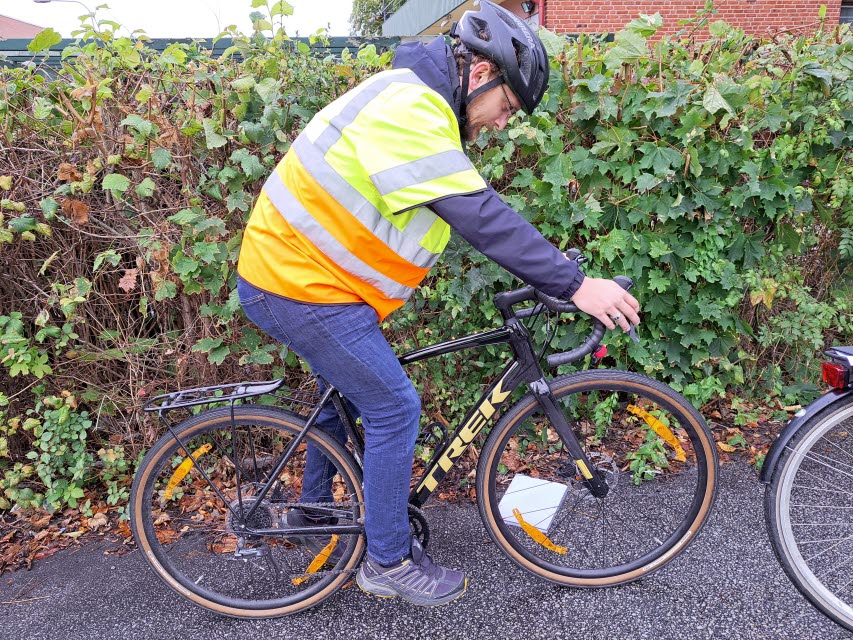Doctoral student with a focus on cycling sees bright future

Traditionally, road engineering research at VTI has focused on roads used by cars. Doctoral student Martin Larsson wants to expand that knowledge by focusing on cycle paths and methods to improve their standard. The future of cycling looks bright, he believes.
“My doctoral project is currently about bicycle paths and falling weight measurements. They provide information about the bearing capacity of the road structure and how the road surface handles the loads it will be subjected to,” says Martin Larsson.
He is particularly interested in seeing if the bearing capacity deteriorates. Cracks often appear at the edges, which may be due to the fact that maintenance vehicles may be a little too heavy for the surface.
“In fact, we can already say something about this before the study is completed. We see greater deflection at the edges, which municipalities need to bear in mind in the future when constructing new cycle paths.”
Martin Larsson will be able to tell us more about this research, which is being conducted in collaboration with Linköping Municipality, at Transportforum, the conference that VTI is arranging in Linköping from 17 to 18 January 2024.
The next part of the doctoral project will be to test cycle paths in VTI’s Heavy Vehicle Simulator. Under controlled conditions, it is possible to simulate real loads from heavy vehicles, study how different types of road structures work and test hypotheses.
Compared to many researchers at VTI, Martin Larsson has a somewhat different background. Martin studied construction engineering at Malmö University. The education also included a course on traffic in infrastructure, which made him want to study for a Master’s degree in engineering with a focus on road and traffic engineering. From there on he was captivated by the conditions for cycling.
“I also cycle two kilometres to and from work. I’m not a cycling fanatic, I consider myself more of a utilitarian – one who believes that the right action is the one that maximizes utility. As a researcher, I am interested in accessibility for cyclists and as someone who is somewhat eccentric at VTI’s Lund office, where many of my colleagues are focused on public transport.”
In March, Martin Larsson took his licentiate degree, which comprises two parts. One aspect is based on a survey of Sweden’s municipalities on street and cycle path maintenance, including the damage that occurs and what it may be due to. The second aspect is about measuring the smoothness of cycle paths and is a comparison between VTI’s own measuring equipment and an RST, Road Surface Tester, a device that can measure and collect data on several of the different characteristics of the road surface at normal traffic speeds.
“The equipment works well as a measuring tool and is sufficient to measure everything that the cyclist can experience, in terms of evenness on the surface of the cycle path taking into consideration different surfaces, such as asphalt, concrete and gravel.
In addition to his doctoral work, he has also participated in the Bicycle Comfort project, which VTI has organised together with the company Ramboll, where the goal is to develop a standard measurement. Researchers from other EU countries are also involved in finding a common ground.
The intensive period until the PhD project is completed is tough. There is a lot left to do that requires a lot of focus. There will be many trips to the VTI office in Linköping. VTI has four offices, in addition to Lund and Linköping, Gothenburg and Stockholm, and all of them have doctoral projects in the field of cycling. Martin Larsson participates in several doctoral networks: At MISTRA InfraMaint, KTH’s Department of Civil and Architectural Engineering and VTI’s Cykelcentrum (Swedish Cycling Research Centre). Cykelcentrum is of great significance as an important reference point – all those involved in cycling refer to Cykelcentrum, he says.
“Cycling is on the increase. I believe that we are moving towards a future where the car will be forced back in favour of cycling because of environmental, climate and sustainability reasons, but also because of congestion, air quality and public health. There are strong arguments for cycling, especially the socio-economic effects. There is a political will in many places to work for increased cycling and good cycling infrastructure.
Martin Larsson is the last in a line of employees to be honoured by VTI in 2023 through a series of portraits in connection with the 100th anniversary of Road Engineering Research.
Text: Gunilla Rech
Translation: CBG
Martin Larsson
Family: Partner and dog.
Residence: Lund
Age: 40 years.
Interests: I have time to work out a little bit and I like to eat well. At the moment, he reads a lot related to his work – so that literature is also available at the bedside table. It can be anything from road construction to research theory. I may watch films from time to time – mostly documentaries.
